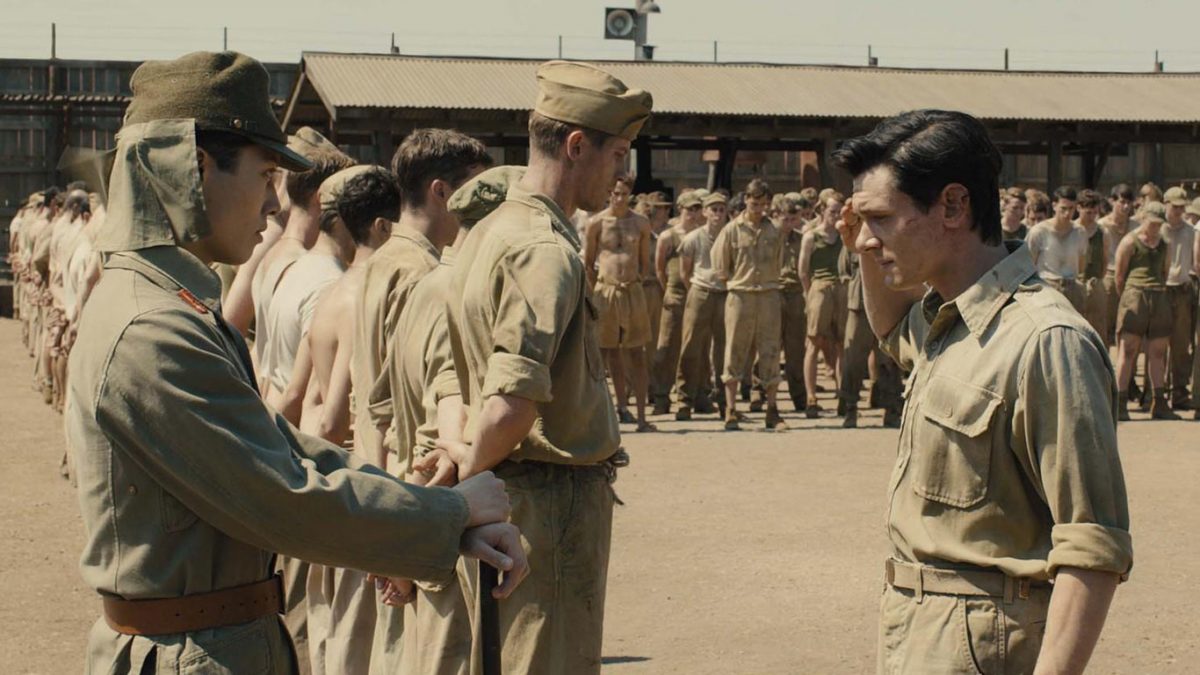
The hackneyed phrase, “If you can take it, you can make it” is uttered several times in Unbroken and, I’m afraid to say, is also pretty much the sum total of the film. It’s basically If You Can Take It, You Can Make It: The Movie.
Director Angelina Jolie has based her story on the Laura Hillenbrand’s book about real-life Olympic athlete and WWII hero Louis Zamperini, who died just this year.
It’s clear that Jolie loves Zamperini—perhaps too much. As both Lincoln and the upcoming Selma have shown, the best way to honor your heroes is to show their weaknesses, their humanizing flaws. Jolie gives us a Zamperini you might expect from a 12-year-old’s earnest book report.
The story, indeed, is remarkable. Zamperini (played by C.J. Valleroy as a child), the son of Italian immigrants, was a bit of a bad kid—shoplifting, getting into scrapes, and the like. His big brother, for no apparent reason, directs Louie’s attention to long-distance running, uttering the soon-to-be-fateful words “if you can take it, you can make it” (again, for no apparent reason). Louie, now played by exciting newcomer Jack O’Connell, does indeed take it and make it, becoming an Olympiad while he’s still just in high school, distinguishing himself with his unlikely bursts of speed down the home stretch. He has his eyes set on the 1940 Olympics in Tokyo, but WWII comes calling and he becomes a bombardier instead—and a good one.
Then his plane crashes into the Pacific and he and two other soldiers (Finn Wittrock and Domhnall Gleeson) are left adrift. The prospects of surviving, much less being rescued, are bleak, but Louie keeps up the spirits of his mates by sharing stories of his mother’s gnocchi and giving pep talks about the strength of the human spirit.
Eventually, a rescue ship does arrive, but as Louie drolly puts it: “I have good news and bad news…”—the ship is from Japan. So Louie is interned at a Japanese prison camp, where he attracts the attention of a sadistic commander, nicknamed Little Bird (Takamasa Ishihara). Little Bird singles Louie out for humiliation and torture—but Louie never gives up, never backs down. And that’s pretty much it.
As for Jolie’s direction? It’s competent. She makes a few thuddingly obvious choices—like aging Louie from childhood to strapping teendom in a dissolve as he runs down a dusty path—but she acquits herself well in the action scenes, and there are some gorgeous still images scattered throughout.
What the film is missing, is nuance, of any kind. (Doubly stunning, since it was adapted by Joel and Ethan Coen, a fact I still can’t quite wrap my brain around.) There’s a tiny intimation that maybe Little Bird’s obsession with Louie has a sexual nature, but that goes unexplored. I’ve heard, from those who have read the book, that Louie survived his ordeal by employing some gallows humor, some irreverence directed at his captors. But Jolie forgoes that in favor of more scenes of Louie being beaten and abused. It’s not completely unfair to call the film “torture porn.”
Unbroken moves at a nice clip and—since it celebrates the human spirit and American exceptionalism—it feels like a crowd-pleaser. (You might argue that America doesn’t like torture porn, but have you checked out what trends on Facebook lately? Americans will subject themselves to all sorts of depressing and unsavory things, as long as the end result is a comforting, life-affirming narrative. But that’s grist for another essay.)
Jolie has proven she can helm a large scale film like this, so good on her. But in her attempt to honor Louis Zamperini, she turned him into a martyr, not a man.
